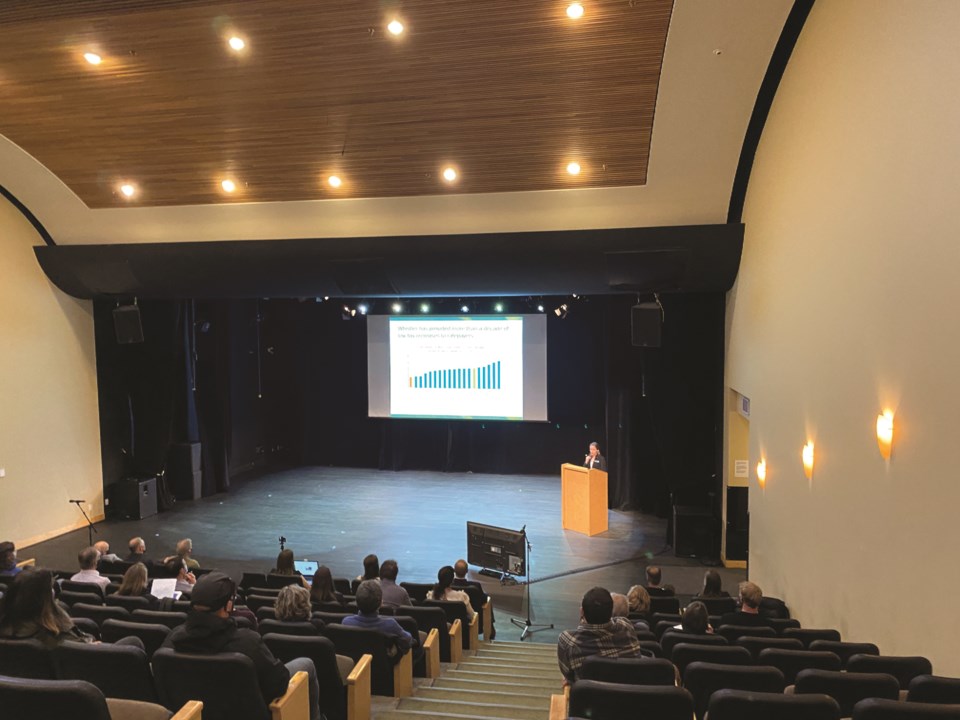With a three-year, $39-million commitment to the Resort Municipality Initiative (RMI) funding program expiring this year, it remains to be seen exactly how much the provincial government will commit to B.C.’s resort communities in its 2022 budget.
The government made the RMI program—which supports small, tourism-based municipalities to build and diversify their tourism infrastructure and offerings—part of its base budget in 2019, with a $13-million annual spend attached to the program.
But as with all spending being considered for budget 2022, future supports for tourism won’t be confirmed publicly until March 2022, a spokesperson said.
Since 2006, the RMI program has doled out more than $140 million in funding to 14 resort communities in B.C., and in Whistler played a key role in achieving the record-breaking visitation numbers seen pre-pandemic.
In Whistler’s 2022 draft budget documents, RMI money—which must be spent on tourist-facing projects that don’t directly benefit residents—is attached to 24 different projects (though not all of them have a specific dollar amount tied to them just yet).
“RMI specifically is focused on visitor amenities at this time, including the construction of the village washrooms and extensive work at the parks,” said director of finance Carlee Price at the Resort Municipality of Whistler’s (RMOW) Nov. 18 budget information session.
“The RMI program is up for renewal in 2022, and so the list of projects that you see with this budget version includes only those projects that have already been approved. Additional works could and likely will be added mid-year when clarity on funding amounts is achieved.”
So far for 2022, the RMOW has budgeted $3,348,521 of RMI spending across 11 projects, $2 million of which will go towards upgrades at Meadow Park and Rainbow Park.
The improvements at Meadow Park include replacing the waterpark, new playground equipment, enhanced picnic areas and recreational space along the river’s edge, as well as a formalized off-leash dog area, while Rainbow Park will see improved waterfront access, watercraft launch and storage facilities, expansion of the special events area and more.
A further $562,228 is allocated for construction of new recreation parking facilities adjacent to Bayly Park to help manage overwhelming demand for access to the area, with preliminary work already underway on the site.
The budget item also includes a Recreation Trail Strategy that the RMOW’s parks planning department is undertaking.
Another $371,079 of RMI money is budgeted for Valley Trail lighting on the 1,200-metre section of trail between Lakeside Park in Alta Vista and Creekside.
Other RMI spends planned for 2022 include the development of visitor awareness guides ($89,768); continued work on the RMOW’s geopark project ($66,961 for trails, viewing decks and interpretation materials); a new Interpretive Panels strategy ($59,685); and $20,000 for landscape and pedestrian circulation improvements in front of the PassivHaus at the entrance to Lost Lake Park.
There’s also $76,226 budgeted for Valley Trail access and safety improvements, including (but not limited to) the gateway out of Whistler Village at the Whistler Golf Club, the Highway 99 crossing at Nesters Road, and the intersection at Nancy Greene Drive and Blackcomb Way.
The RMOW’s draft budget includes a proposed 6.72-per-cent tax increase in 2022, as well as three-per-cent increases to sewer, water and solid waste fees.
Whistlerites have until Dec. 21 to weigh in.
Find complete budget documents and more at whistler.ca/budget.


.jpg;w=120;h=80;mode=crop)


